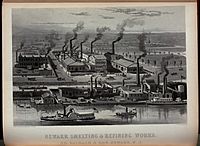- This page was last modified on 17 October 2025, at 10:18. Suggest an edit.
Balbach Smelting & Refining Company facts for kids

Balbach Smelting and Refining Company on the Passaic River, around 1870
The Balbach Smelting & Refining Company was a large factory in Newark, New Jersey. It operated in the late 1800s and early 1900s. This company was very important because it was the first in the United States to use a special method called electrolytic refining to clean metals. Before it closed in the 1920s, it was one of the biggest metal processing companies in the entire country!
The Story of Balbach Smelting
Edward Balbach Jr. was a very smart scientist who studied metals. People who study metals are called metallurgists. He was born in Germany in 1839. He came to the United States in 1848 with his father, Edward Balbach Sr. His father started the family's wealth by collecting tiny bits of gold and silver dust from jewelry shops in Newark. He would melt this dust down to make valuable metal bars.
Amazing Inventions and Growth
In 1865, Edward Balbach Jr. invented a special way to separate gold and silver from lead. This method was called the "Balbach Process". Later, around 1872, his method became very similar to another process called the Parkes process, which was invented earlier in England.
In 1881, the Balbach company started making copper. This was perfect timing because the invention of the telephone, and soon after, electricity, created a huge demand for copper. In 1883, the factory opened its own electrolytic refinery for copper. This was the first time such a refinery was used in the United States!
Changes and Challenges
In December 1910, Edward Balbach Jr. passed away at 72 years old. Control of the company then went to his daughter Julia's husband, Edward Randolph. He had been working at the company since 1898.
Edward Randolph died in 1919. In the 1920s, the Balbach company was closed by its leaders. They decided it was better to have factories closer to where the metal ores were dug out of the ground. After the factory closed, the county bought the land. They turned it into a baseball field, which is now part of Riverbank Park.
Working conditions at the factory could be tough. In the 1880s, workers earned about $1.50 to $1.65 a day. It could also be dangerous. Sometimes, if water got into a boiler, it could turn into steam very quickly and cause an explosion. This could spray hot, melted metal. Accidents could even happen outside the factory. For example, in 1881, a boiler exploded, and a flying brick went through a window of the nearby Balbach family mansion, hitting a sleeping guest.
